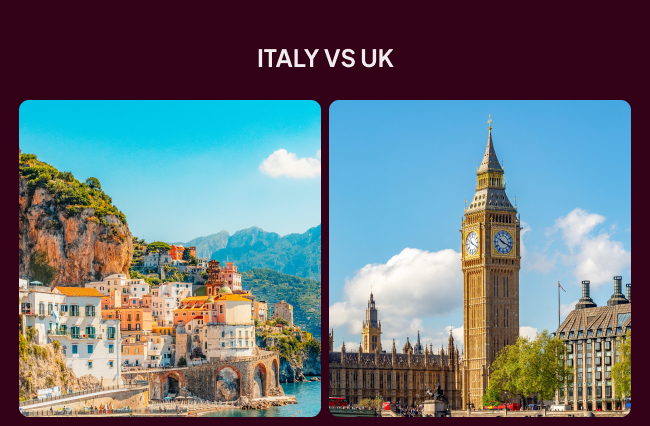Expanding into Europe is a strategic move for entrepreneurs aiming to establish a strong international presence. Among the top destinations for foreign investors, Italy and the United Kingdom consistently stand out for their infrastructure, consumer markets, and global connectivity. However, the choice between them hinges on one key factor: which country offers a better environment for company formation? Suppose you are considering an Italy business setup or weighing it against United Kingdom incorporation. In that case, this detailed guide compares the most relevant factors from tax incentives and setup costs to legal systems and workforce dynamics to help you choose the proper jurisdiction for your business goals.
Business Formation Overview – Italy vs the UK
Legal Entities and Regulatory Framework
Both Italy and the UK offer limited liability structures that are popular among foreign entrepreneurs, but the two countries present notably different regulatory environments. In Italy, the most common legal entities include the SRL (Società a responsabilità limitata), the Srls (Simplified SRL), and the SpA (Società per Azioni).
The Italian Civil Code governs these structures and must also comply with EU business legislation. However, incorporation in Italy often involves heavier administrative requirements, particularly for traditional SRLs and SpAs, which typically require a notary and more extensive documentation. In contrast, the UK simplifies the process significantly with its LTD (Private Limited Company) structure, which is the go-to option for small and medium-sized enterprises.
The regulatory environment is governed by the Companies Act 2006, which supports a more flexible, digital-first system designed to make company formation fast and accessible. This streamlined framework makes the UK particularly attractive to startups and tech-focused businesses seeking rapid market entry.
Business Environment Rankings
According to World Bank and OECD data, the UK consistently ranks higher than Italy in key areas such as “Starting a Business” and “Paying Taxes.” This is mainly due to its streamlined, digital-first processes. Italy, while still a strong contender, tends to score lower because of bureaucratic hurdles, though recent digital reforms are beginning to improve accessibility and efficiency for entrepreneurs.
Setting Up a Business – Step by Step
Italy Business Setup
-
- Draft Articles of Association with a notary
- Open a bank account and deposit share capital
- Register with the Registro delle Imprese (Company Register)
- Apply for a VAT number
- Obtain a Chamber of Commerce registration and tax codes
UK Business Setup
-
- Choose a company name and structure
- Register online with Companies House
- Get a company number and a digital certificate of incorporation
- Register for Corporation Tax with HMRC
- Optional: Register for VAT if above threshold
Timeline Comparison
- Italy: 7–14 business days (more with notary delays)
- UK: As little as 24–48 hours for a complete online process
Digitalisation & Bureaucracy
- UK leads with a fully online and paperless registration process
- Italy still requires some physical steps, especially involving a notary
The UK stands out for its fully digital, paperless company formation process—most businesses can register online within a day.
In contrast, Italy still involves physical paperwork, in-person notary appointments, and multiple agency interactions, making the process slower and more bureaucratic.
How Much Does It Cost to Start a Company?
The cost of company formation varies considerably between Italy and the UK. In Italy, starting a company often involves higher upfront expenses due to notary involvement, with fees typically ranging from €1,000 to €2,000, depending on the business structure. The minimum share capital required for an SRL is €10,000, although only 25% must be paid upfront. For a simplified Srls, the capital can be as low as €1, though this option comes with certain limitations. Additional costs include government registration and tax payments of approximately €400, plus ongoing expenses such as accounting services, social security contributions, and Chamber of Commerce dues. In the UK, forming a Private Limited Company is significantly more affordable and streamlined.
The government registration fee ranges from £12 to £40, depending on whether the application is filed online or by post. The minimum share capital required is just £1, and no notary services are needed. Ongoing compliance costs are minimal, typically involving an annual confirmation statement fee of around £13, along with optional expenses such as basic accounting software or hiring an external accountant.
Which Country Offers Better Tax Conditions?
| Tax Feature | Italy | United Kingdom |
| Corporate Income Tax | 24% + 3.9% IRAP | 19% (as of 2024) |
| VAT Rate | 22% standard | 20% standard |
| Dividend Withholding Tax | 26% (reduced via treaties) | 0% for UK residents, 20% for others |
| Startup Incentives | R&D credits, Smart & Start Italia, EU grants | SEIS, EIS, R&D Tax Relief |
| Tax Filing Frequency | Quarterly VAT, annual CIT returns | Quarterly VAT, annual CT600 return |
Italy offers attractive tax credits for innovation, particularly in Southern Italy. However, the UK’s business-friendly tax regime is simpler and widely trusted by international investors.
Ease of Opening a Business Bank Account
Opening a business bank account in Italy can be slow and often requires in-person visits, documentation in Italian, and a local presence. In contrast, the UK offers a faster, mostly online onboarding experience, especially with digital banks like Wise, Tide, or Revolut, making it easier for international founders.
Italy
- Slower process with in-person appointments, document verifications, and language considerations
- Local banks often require physical presence
UK
- Quick and mostly online onboarding, especially with digital banks like Wise, Tide, or Revolut
- Easier for non-residents with proper documentation
Access to Credit & Finance
- Italy has state-funded incentives and EU-backed loans, especially for industrial and innovation-focused sectors.
- The UK offers venture capital access, fintech lenders, and investor-friendly schemes like SEIS/EIS.
Italy provides access to government-backed incentives and EU-funded loans, particularly for manufacturing and innovation-driven sectors. Meanwhile, the UK has a more developed venture capital landscape and investor schemes such as SEIS and EIS, ideal for startups and high-growth businesses.
Communication, Etiquette & Language
Business culture in Italy tends to be formal and hierarchical, with a strong emphasis on building personal relationships before closing deals. Italian is the primary language for official and legal communication, which may require translation services for non-Italian-speaking founders. In contrast, the UK features a more direct, structured, and efficiency-driven business environment. English, as the native language, enhances global accessibility and communication. The UK also leads in digital readiness, especially in administrative tasks and cloud-based documentation, making it easier for international entrepreneurs to manage operations remotely and efficiently.
Advantages of Doing Business in Italy
- Strategic location in Southern Europe with easy access to the Mediterranean, MENA, and EU markets
- Renowned industries: fashion, luxury, food, automotive, tourism
- EU grants and tax credits for innovation, digitalisation, and startups
- Strong local networks and skilled engineering/manufacturing talent
Advantages of Doing Business in the UK
- Fast and 100% digital incorporation process
- English-speaking environment and global trust
- Robust legal and regulatory system (Common Law)
- Strong financial services and technology sectors
- Business-friendly tax and compliance ecosystem
- Post-Brexit flexibility for global trade
Whether you prioritise EU market access or a globally recognised business framework, both countries offer compelling benefits depending on your goals. Italy excels in traditional industries and regional trade, while the UK stands out for tech, finance, and ease of doing business. Understanding the strategic strengths of each jurisdiction can help you align your expansion plans with long-term success.
Which Country Should You Choose?
Choose the UK if
- You need a fast, affordable, and paperless setup
- You are targeting English-speaking clients and investors
- Your business is digital, fintech, consulting, or SaaS-based
- You value lower tax complexity and flexible employment laws
Choose Italy if
- You want direct access to the EU and Mediterranean markets
- Your business is in the manufacturing, fashion, tourism, or luxury sectors
- You qualify for EU or Italian innovation grants
- You plan for a culturally aligned long-term investment in Southern Europe
Your decision should be guided by the nature of your business, operational goals, and level of investment. Also consider the speed of market entry, administrative preferences, and your long-term vision for European expansion. A tailored approach ensures you maximise both compliance and commercial advantage.
How Can We Help?
We specialise in helping entrepreneurs choose the proper European jurisdiction and handle every aspect of company formation.
We provide
- Free consultation to assess your goals
- Company formation services in both Italy and the UK
- Legal document preparation and submission
- VAT, tax, and payroll registration
- Ongoing compliance support in your chosen jurisdiction
Our local experts ensure a smooth experience from setup to launch, no matter where you incorporate. We tailor our services to meet your specific business needs, allowing you to focus on growth while we handle the regulatory complexity. From paperwork to strategic advice, we’re your trusted partner in European expansion.
Conclusion
Choosing between Italy business setup and UK company formation is a strategic decision that should align with your budget, goals, and industry focus. Both offer unique strengths: Italy with its EU market access and traditional industries, and the UK with speed, flexibility, and investor friendliness. No matter your choice, the proper guidance makes all the difference. Contact us today to start your European expansion the right way.



